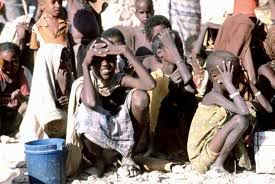Cross posted from The Stars Hollow Gazette
Somalia is suffering the worst food shortage in 60 years.

The combination of severe drought and a conflict in Somalia is driving people across its borders as they seek food, water and safety. Almost half the children arriving in refugee camps in Ethiopia from southern Somalia are malnourished. This is a very visible tragedy of families who’ve walked for weeks, their children growing weak with hunger, in need of assistance.
Consecutive poor rainy seasons have resulted in communities struggling year after year, never fully recuperating from previous droughts. Few resources have been made available to ensure families recover and to mitigate future crises.
In some cases, a phenomenon called “green drought” has led to misunderstandings about what families are facing. “Green drought” gives the faulty appearance of a lush landscape when light rain causes greenery to spring up from the earth. Unfortunately, this vegetation is often inedible, leaving people without enough food to eat. To outsiders it seems unbelievable.
In other cases, families are facing a food shortage due to a lack of land on which to grow crops. Land is passed down to children and, over the years, the available plots to produce food have been growing smaller and smaller. With the added pressures of erosion, there is rarely enough land to grow the food needed, despite how much or how little it rains.
These challenges, combined with climate change, extreme and consistent poverty and conflict are just some of the causes of this grave situation.
UNICEF has resumed airlifts into parts of Somali controlled by militants with the blessings of said militants:
Last week, al-Shabab said it welcomed the return of humanitarian groups into the areas it controls.
Also Wednesday, the African Union said it is working with AU peacekeepers to increase security in Somalia to ensure that humanitarian assistance gets to Somalis who need it. An AU spokesman said the African Union is helping to secure both the seaport and the airport, making it possible to bring in the aid supplies.
He also said former Ghanaian president Jerry Rawlings will soon go to Somalia to assess the situation for the African Union.
Earlier Wednesday, the U.N. World Food Program said it may resume operations in southern Somalia if security conditions allow. The WFP halted its work in areas controlled by al-Shabab last year, citing threats and extortion demands.
While the United States response of $5 million to assist the relief effort is admirable, the US is more concerned about counter-terrorism. As reported by Jeremy Scahill in The Nation, our government in their wisdom has been running a fortified compound near the capital’s airport for training Somali intelligence agents in counterterrorism and a prison in the basement of Somalia’s National Security Agency headquarters for detaining suspected terrorists. Umm, so much for ending those secret prisons that Obama’s supporters will swear have been all closed.
The US has been ratcheting up operations in Somalia for months and has admitted to sending unmanned drones and then marines to collect the bodies of the miltants.. How many wars does this make now in the no longer existent Global War On Terror? 5? 6? I’m losing count.
Glen Ford of the Black Agenda Report rightly asserts that the US has helped exacerbate this crisis by militarization of the region:
The Americans blame the al-Shabab resistance for exacerbating the drought emergency, but for at least two years the Americans have used food as a weapon of war in Somalia, in an effort to starve out those who might be supporting the Shabab. The U.S. has armed an array of militias operating near the Ethiopian and Kenyan borders, making normal agricultural pursuits all but impossible, and the current world-class catastrophe, inevitable.
Whenever the U.S. ratchets up its armed interventions in Somalia, disaster follows. Four years ago, after the Americans instigated an Ethiopian invasion of Somalia to overthrow an Islamist government that had brought a semblance of peace to the region, it set off what the United Nations then called “the worst humanitarian crisis in Africa – worse than Darfur.” Today, many of those same refugees are confronted with the worst humanitarian crisis on the planet – once again, largely courtesy of the United States.
Maybe if the government defaults, they’ll have to end this madness.
 Welcome to the Health and Fitness weekly diary which is cross-posted from The Stars Hollow Gazette. It is open for discussion about health related issues including diet, exercise, health and health care issues, as well as, tips on what you can do when there is a medical emergency. Also an opportunity to share and exchange your favorite healthy recipes.
Welcome to the Health and Fitness weekly diary which is cross-posted from The Stars Hollow Gazette. It is open for discussion about health related issues including diet, exercise, health and health care issues, as well as, tips on what you can do when there is a medical emergency. Also an opportunity to share and exchange your favorite healthy recipes. 









